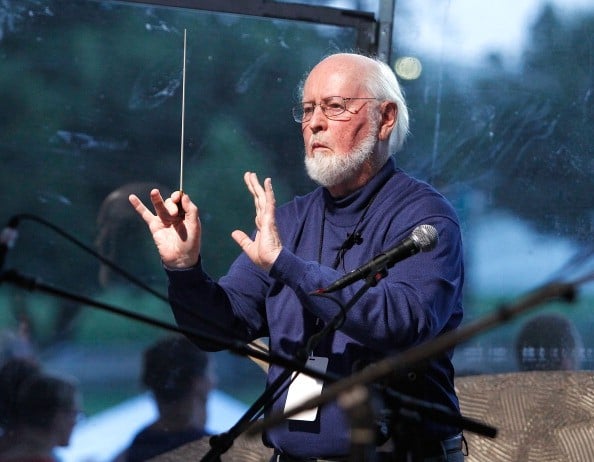What is John Williams's Net Worth?
John Williams is a prolific music conductor who has a net worth of $300 million. John Williams' career has spanned seven decades. He is famous for creating some of the most iconic film scores in history, including those for "Jaws," "Close Encounters of the Third Kind," the "Star Wars" saga, "Superman," and the "Indiana Jones" and "Harry Potter" films, among others. Williams has also composed numerous classical concertos; served as the principal conductor for the Boston Pops Orchestra; and composed music for various television programs and special events.
Early Life and Education
John Williams was born on February 8, 1932 in the Queens borough of New York City to Esther and percussionist John Sr. He has three younger siblings named Jerry, Joan, and Donald. In 1948, the family moved to Los Angeles, where Williams attended North Hollywood High School. He went on to attend UCLA while studying composition privately with Italian composer and pianist Mario Castelnuovo-Tedesco. For one semester, Williams went to Los Angeles City College to play with its jazz band. He continued to play music, and to conduct, after he joined the US Air Force in 1951. Following the completion of his service in 1955, Williams moved back to New York City and enrolled at the Juilliard School. He also studied at the Eastman School of Music at the University of Rochester.
Career Beginnings
After his studies, Williams returned to Los Angeles and started working for film studios as an orchestrator. Additionally, he served as a studio pianist and session musician, contributing to scores by such major composers as Jerry Goldsmith, Henry Mancini, and Elmer Bernstein. During this time, Williams also released a number of jazz albums, including "World on a String," and served as the music arranger and bandleader on albums by singers Frankie Laine and Ray Vasquez.
Film Scores, Part 1
Williams composed his first feature film score for the 1958 B-movie "Daddy-O." Two years later, he wrote the score for "Because They're Young." Williams gradually built up a reputation in Hollywood for his incredible musical versatility. In 1967, he earned his first Academy Award nomination for his score to "Valley of the Dolls." Williams received his second nomination for the 1969 musical "Goodbye, Mr. Chips." He won on his third nomination, for the 1971 film adaptation of the musical "Fiddler on the Roof." Williams subsequently composed the scores for such films as "Images," "The Poseidon Adventure," "The Towering Inferno," "Earthquake," and "The Cowboys."
Williams began his most prolific collaboration in 1974 when he wrote the score for Steven Spielberg's debut feature film, "The Sugarland Express." He would go on to compose for nearly every film directed by Spielberg from that point on. For his iconic score to Spielberg's 1975 thriller "Jaws," Williams won his second Academy Award. He produced another iconic score for Spielberg's 1977 science-fiction film "Close Encounters of the Third Kind." Also in 1977, Williams won his third Academy Award for "Star Wars," whose theme remains among the most recognizable musical pieces in film history. He returned to write the music for the later films in George Lucas' "Star Wars" saga. Among his other credits in the late-70s, Williams created the iconic theme music to Richard Donner's "Superman."

Paul Morigi/Getty Images
Film Scores, Part 2
In the early 80s, Williams composed the famous scores to Spielberg's "Raiders of the Lost Ark" and "E.T. the Extra-Terrestrial"; for the latter, he won his fourth Academy Award. He composed the music for both of Spielberg's "Indiana Jones" sequels later in the decade, as well as for Spielberg's coming-of-age war film "Empire of the Sun." His other notable credits in the 80s include his Academy Award-nominated score for "The Accidental Tourist." In the 90s, Williams won a fifth Academy Award for his score to Spielberg's Holocaust drama "Schindler's List." He also scored such films as "Home Alone," "Hook," "JFK," "Jurassic Park," "Sabrina," "Seven Years in Tibet," "Saving Private Ryan," and "Angela's Ashes."
Williams continued to be prolific into the 21st century, kicking things off with the score to Roland Emmerich's "The Patriot." In 2001, he did the score to the first "Harry Potter" film, and later returned to score the second and third films in the series. Williams's other credits in the 00s include "A.I. Artificial Intelligence," "Catch Me if You Can," "Memoirs of a Geisha," and "Munich." In the 2010s, he scored such films as "The Adventures of Tintin," "War Horse," "Lincoln," "The Book Thief," and "The Post." Williams later wrote the score to Spielberg's semi-autobiographical 2022 film "The Fabelmans," for which he earned his 53rd Academy Award nomination.
Conducting and Other Works
From 1980 to 1993, Williams was the principal conductor of the Boston Pops Orchestra. After leaving the group, he was made the Pops' laureate conductor. He has also conducted the New York Philharmonic, the National Symphony Orchestra, and the Berlin Philharmonic, among many other orchestras. Williams makes annual appearances at the Hollywood Bowl with the Los Angeles Philharmonic. Moreover, he has written numerous concert pieces, including symphonies and concertos for orchestral ensembles.
Among his many other notable musical works, Williams composed the theme music for multiple Olympic Games, as well as for such television programs as "NBC Sunday Night Football," "Lost in Space," and "Land of the Giants."
Personal Life
In 1956, Williams married actress and singer Barbara Ruick. Together, they had three children: Jennifer, Mark, and Joseph Williams. The lattermost child is best known as the lead singer of the rock band Toto. Williams and Ruick remained married until Ruick passed away in 1974. Six years later, Williams wed photographer Samantha Winslow.
Real Estate
In 1976, John and Barbara paid $170,000 for a home in Los Angeles. Today this home is worth $7-10 million.
Read more: John Williams Net Worth


0 Comments